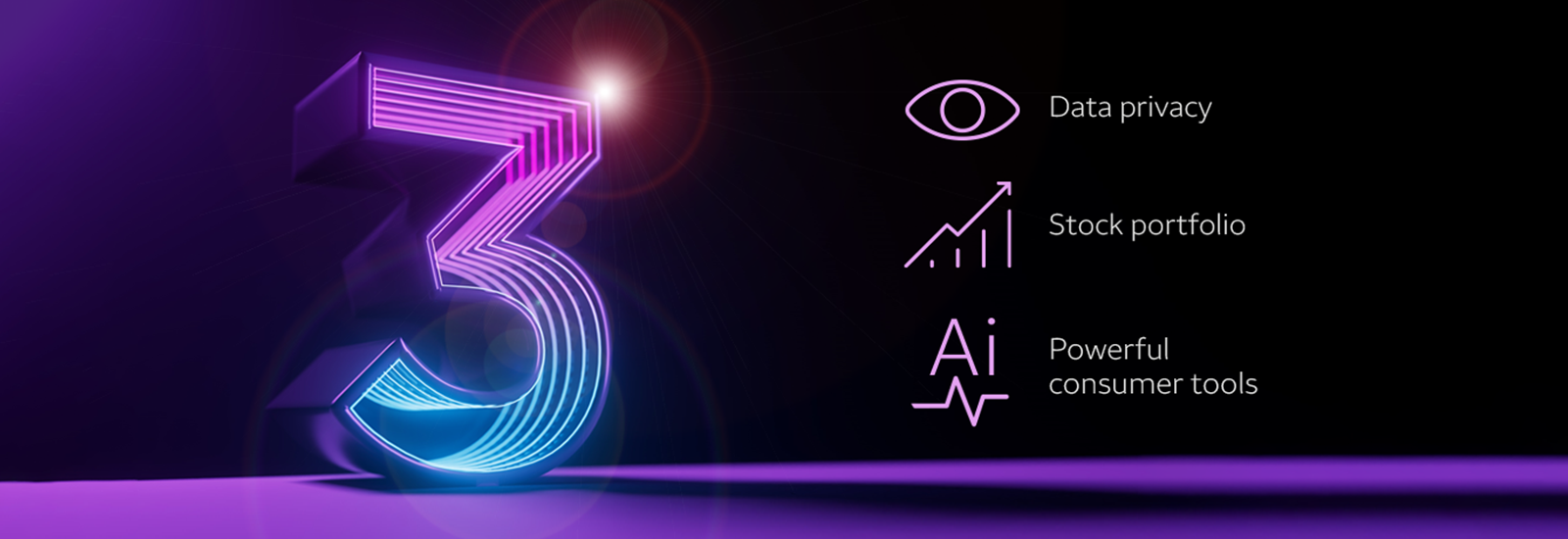Editor’s note
This is part 2 of the Wells Fargo Stories quantum computing series. Read part 1: “5 Big Questions on Quantum Computing Answered.”
Key takeaways
- Investing in quantum computing has big potential to benefit you. For example, quantum computing could make your information more secure through differential privacy.
- Quantum computing could also put more money in your wallet by boosting stock portfolio returns via better predictive models.
- Better-performing artificial intelligence programs may be possible through synthetic data produced by quantum computing technology.
Quantum computing is still in its infancy, but Wells Fargo developers exploring this advanced technology are beginning to find possible quantum opportunities to benefit customers in the future. Here are three ways quantum computing could begin to improve how you bank.
1. More privacy for your data
One thing quantum computers excel at is finding a needle in a haystack. Why’s that useful, you ask?
Take data privacy, for example. When developers use data, such as when they train an artificial intelligence program, they want to protect identifiable information like their birthday or ZIP code.
The traditional protection method of anonymizing data relies on classical computers hiding or taking out customer information, which undercuts the data’s accuracy. With quantum computers being built today, companies can mask data through differential privacy, an increasingly popular security process of distorting data — the needle — in a measurable way involving a near-infinite set of numbers — the haystack. What was once a lengthy affair could be instant.
“Differential privacy is expensive with classical computers, so this was one of the applications of quantum computing we’re exploring, and we have a paper on it in the works,” said Constantin Gonciulea, a technology fellow with Wells Fargo.
[Video overview: Chintan Mehta, Wells Fargo head of Digital Technology and Innovation, talks about one of the fundamental benefits of quantum process: the ability to mimic nature.]
[Music]
[On-screen text]
Quantum crushes complexity featuring Chintan Mehta, Wells Fargo
[Chintan Mehta, Wells Fargo head of Digital Technology and Innovation]
The fundamental benefits of quantum process is going to be the ability to mimic nature, which is where a lot of the financial process, for example, can be represented in a much better way than the traditional approaches that are being taken. The underlying principle around this proximity is if the process has a degree of randomness built into it or a stochasticness built into it, we believe that quantum is going to be actually able to represent that process and then optimize it in a lot more easier way than the traditional techniques do, and that’s what we are trying to solve.
[On-screen text]
© 2023 Wells Fargo Bank, N.A. All rights reserved
Watch: Quantum computing’s ability to simulate nature could optimize complex financial processes, says Chintan Mehta, Wells Fargo’s chief information officer and head of Digital Technology & Innovation. (0:39)
2. Optimized returns for your stock portfolio
It’s hard to predict stock prices when they can change in a fraction of a second, sometimes for reasons that aren’t obvious. Because quantum algorithms are great at modeling data when we don’t know all the variables, it’s an area where quantum computers could help.
While quantum algorithms aren’t crystal balls that can predict the future, they can more efficiently measure the likelihood of certain outcomes, such as a given stock price, compared with classical computers.
Vanio Markov, a distinguished engineer for Wells Fargo Technology, says one approach could be building mathematical models that simulate how stock prices change called quantum stochastic generators. Quantum could also one day help to train AI to make stock portfolio trading decisions more efficiently, according to Wells Fargo Senior Research Scientist Yen-chi “Samuel” Chen.
These quantum tools could support how financial services companies like Wells Fargo build and maintain investment portfolio algorithms to optimize returns for customers.
“Our quantum models of stock prices are simpler than the classical models … so quantum learning can be very efficient,” Markov said. “We hope that our quantum algorithm will enrich the ensemble of algorithms Wells Fargo uses to estimate stock prices.
3. Supercharged AI to make your life easier
AI is in the limelight as powerful tools become available to consumers, but quantum computers could supercharge this technology. Wells Fargo’s quantum experts say there could be major innovations coming from the intersection of AI and quantum.
“I am optimistic that we are beginning to enter an era in which we will soon begin to see momentum building around the value and usefulness emerging from quantum computing.”
On top of better protecting customer data, quantum technology could also help Wells Fargo data scientists build machine learning tools more easily by generating synthetic data. Synthetic data, or computer-generated information often modeled on the real thing, is useful because it can be easier to leverage and safer.
Plus, more data means there’s more to test and learn from. For example, Wells Fargo developers are looking into using generated financial transaction data to fight fraud. These quantum tools could support how financial services companies like Wells Fargo build and maintain investment portfolio algorithms to optimize returns for customers.
“Our quantum models of stock prices are simpler than the classical models … so quantum learning can be very efficient,” Markov said. “We hope that our quantum algorithm will enrich the ensemble of algorithms Wells Fargo uses to estimate stock prices.
[Video overview: Chintan Mehta, Wells Fargo head of Digital Technology and Innovation discusses Wells Fargo’s work in quantum.]
[Music]
[On-screen text]
Getting quantum-ready featuring Chintan Mehta, Wells Fargo
[Chintan Mehta, Wells Fargo head of Digital Technology and Innovation]
Wells Fargo’s work in quantum is on two vectors. First one is around quantum safety, quantum-safe algorithms, which are essentially what allows us to continue using our encryption techniques even when quantum is able to actually break the traditional RSA encryptions. The second one is around actually using quantum to actually be more efficient and more productive in the day-to-day stuff that we do, like AI development, training cycles. At the end of the day, to bring productivity and value to the customers as we build these out.
[On-screen text]
© 2023 Wells Fargo Bank, N.A. All rights reserved.
Watch: Mehta says Wells Fargo is getting ready to use quantum computing for two primary reasons: first, for cybersecurity, such as with quantum data encryption, and two, for efficiency, such as with training artificial intelligence. (0:37)






